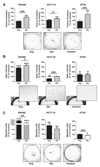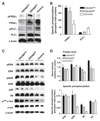Differential effects of polymorphic alleles of FGF receptor 4 on colon cancer growth and metastasis
- PMID: 22971346
- PMCID: PMC5455878
- DOI: 10.1158/0008-5472.CAN-11-3654
Differential effects of polymorphic alleles of FGF receptor 4 on colon cancer growth and metastasis
Abstract
A gly(388)arg polymorphism (rs351855) in the transmembrane domain of the fibroblast growth factor receptor (FGFR4) is associated with increased risk, staging, and metastasis in several different types of cancer. To specifically assess the impact of the polymorphic FGFR4 in colorectal cancer (CRC), we engineered CRC cell lines with distinct endogenous expression patterns to overexpress either the FGFR4(gly) or FGFR4(arg) alleles. The biologic analyses revealed an oncogenic importance for both polymorphic alleles, but FGFR4(gly) was the stronger inducer of tumor growth, whereas FGFR4(arg) was the stronger inducer of migration. An evaluation of clinical specimens revealed that FGFR4 was upregulated in 20/71 patients independent of gly(388)arg status. There was no correlation between the presence of an FGFR4(arg) allele and CRC or polyp risk in 3,471 participants of the CORSA study. However, among 182 patients with CRC, FGFR4(arg)-carriers had a fivefold higher risk of tumors that were stage II or greater. Together, our results established that both allelic forms of FGFR4 exert an oncogenic impact and may serve equally well as therapeutic targets in CRC. One important implication of our findings is that FGFR4(arg)-carriers are at a higher risk for more aggressive tumors and therefore may profit from early detection measures.
©2012 AACR.
Conflict of interest statement
No potential conflicts of interest were disclosed.
Figures




Similar articles
-
Cancer progression and tumor cell motility are associated with the FGFR4 Arg(388) allele.Cancer Res. 2002 Feb 1;62(3):840-7. Cancer Res. 2002. PMID: 11830541
-
ECRG1 and FGFR4 single nucleotide polymorphism as predictive factors for nodal metastasis in oral squamous cell carcinoma.Cancer Biomark. 2012-2013;12(3):115-24. doi: 10.3233/CBM-130299. Cancer Biomark. 2012. PMID: 23481570
-
The fibroblast growth factor receptor 4 (FGFR4) Arg388 allele correlates with survival in head and neck squamous cell carcinoma.Exp Mol Pathol. 2007 Feb;82(1):53-7. doi: 10.1016/j.yexmp.2006.05.003. Epub 2006 Nov 3. Exp Mol Pathol. 2007. PMID: 17084840
-
FGFR4 transmembrane domain polymorphism and cancer risk: a meta-analysis including 8555 subjects.Eur J Cancer. 2010 Dec;46(18):3332-8. doi: 10.1016/j.ejca.2010.06.017. Epub 2010 Jul 16. Eur J Cancer. 2010. PMID: 20638838 Review.
-
FGFR4 Gly388Arg Polymorphism Reveals a Poor Prognosis, Especially in Asian Cancer Patients: A Meta-Analysis.Front Oncol. 2021 Oct 19;11:762528. doi: 10.3389/fonc.2021.762528. eCollection 2021. Front Oncol. 2021. PMID: 34737965 Free PMC article.
Cited by
-
Prognostic significance of fibroblast growth factor receptor 4 polymorphisms on biochemical recurrence after radical prostatectomy in a Chinese population.Sci Rep. 2016 Sep 19;6:33604. doi: 10.1038/srep33604. Sci Rep. 2016. PMID: 27640814 Free PMC article.
-
Fibroblast growth factor receptor 4 induced resistance to radiation therapy in colorectal cancer.Oncotarget. 2016 Oct 25;7(43):69976-69990. doi: 10.18632/oncotarget.12099. Oncotarget. 2016. PMID: 27650548 Free PMC article.
-
FGFR4 role in epithelial-mesenchymal transition and its therapeutic value in colorectal cancer.PLoS One. 2013 May 16;8(5):e63695. doi: 10.1371/journal.pone.0063695. Print 2013. PLoS One. 2013. PMID: 23696849 Free PMC article.
-
Metabolic glucose status and pituitary pathology portend therapeutic outcomes in acromegaly.PLoS One. 2013 Sep 9;8(9):e73543. doi: 10.1371/journal.pone.0073543. eCollection 2013. PLoS One. 2013. PMID: 24039977 Free PMC article.
-
Major vault protein supports glioblastoma survival and migration by upregulating the EGFR/PI3K signalling axis.Oncotarget. 2013 Nov;4(11):1904-18. doi: 10.18632/oncotarget.1264. Oncotarget. 2013. PMID: 24243798 Free PMC article.
References
-
- Bange J, Prechtl D, Cheburkin Y, Specht K, Harbeck N, Schmitt M, et al. Cancer progression and tumor cell motility are associated with the FGFR4 Arg(388) allele. Cancer Res. 2002;62:840–7. - PubMed
-
- Ma Z, Tsuchiya N, Yuasa T, Inoue T, Kumazawa T, Narita S, et al. Polymorphisms of fibroblast growth factor receptor 4 have association with the development of prostate cancer and benign prostatic hyper-plasia and the progression of prostate cancer in a Japanese population. Int J Cancer. 2008;123:2574–9. - PubMed
-
- Spinola M, Leoni V, Pignatiello C, Conti B, Ravagnani F, Pastorino U, et al. Functional FGFR4 Gly388Arg polymorphism predicts prognosis in lung adenocarcinoma patients. J Clin Oncol. 2005;23:7307–11. - PubMed
-
- da Costa Andrade VC, Parise O, Jr, Hors CP, de Melo Martins PC, Silva AP, Garicochea B. The fibroblast growth factor receptor 4 (FGFR4) Arg388 allele correlates with survival in head and neck squamous cell carcinoma. Exp Mol Pathol. 2007;82:53–7. - PubMed
-
- Streit S, Bange J, Fichtner A, Ihrler S, Issing W, Ullrich A. Involvement of the FGFR4 Arg388 allele in head and neck squamous cell carcinoma. Int J Cancer. 2004;111:213–7. - PubMed
Publication types
MeSH terms
Substances
Grants and funding
LinkOut - more resources
Full Text Sources
Other Literature Sources
Medical
Miscellaneous

